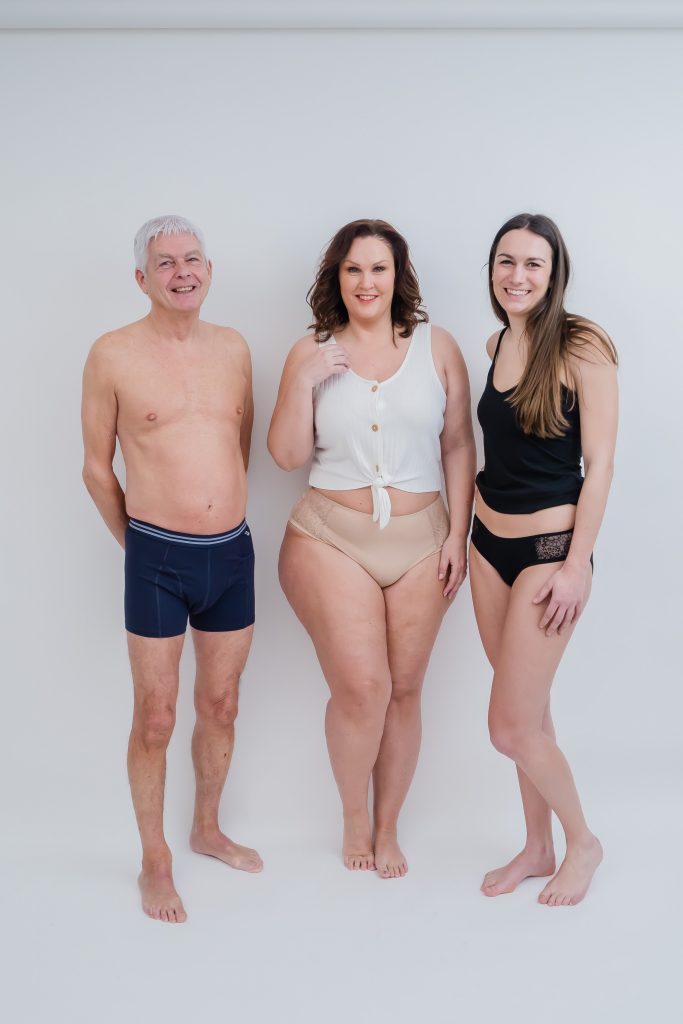you are not alone

1 in 3 women and
1 in 4 men older than 50 years
suffers from urine leakage.
This ranges from a few drops to larger volumes. Not only the elderly, but also young people suffer from urine loss. In 80% of the cases it can be remedied, the others 20% can reduce it to a great extent through the right approach.
The main causes:
Women:
Pregnancy
Childbirth
Menopause
After surgery
Becoming older
Men:
Prostate enlargement
Prostate- and / or bladder surgery
Age
Being overweight
Physical condition (ex.: muscle weakness)
What are the most common types of urine leakage?
– Effort- or stressincontinentie:
Loss of urine due to sudden movements or efforts. For instance: coughing, sneezing, laughing, jumping or lifting heavy weights.
– Urge incontinence:
An "overactive bladder". With this shape you feel that you have to urinate, but unfortunately the urine also is there immediately. This is because your bladder contracts tightly when it is not yet required. For example due to stress or diabetes. For men, this can also occur with an enlarged prostate or after prostate surgery.
– Oveflow incontinence:
The overflow of the bladder causing leaks. This is usually caused by an obstruction or nerve damage.
– Dripping (men):
Urine that leaks after a toilet visit even though there was enough waiting or "shaken". The bladder does not empty completely when urinating and the rest of the urine accumulates somewhere in the urethra near the bladder. This can be due to an enlarged prostate or weakened pelvic floor muscles.
Loss of urine is more common with women, why?
Unfortunately, there is only one simple reason for this: anatomy.
Women have, on the contrary to men, no separate sphincter that closes the urethra. The pelvic floor muscles perform this function in women. These muscles often become weaker after pregnancy, childbirth, transition, … . Men experience the most from urine leakage when there is a problem with their prostate.
How many women suffer from urine leakage?
1 on 3 adult women ever has to deal with urine leakage and almost 10% has daily problems. This of course has a major impact on their daily lives. 63% who will be affected, indicates that it has a disruptive impact on their social life. The older you get, the more likely you are to have urine leakage.
Why Entusia Men?

Panty liners for urine leakage… At first thought: "This is all for women," and in most cases it is. For men, the mental step to using these materials is much more difficult. Entusia Men was designed to reduce this step for men as well and to give them the comfort and confidence they deserve.
Do you know the unpleasant feeling of dripping / light urine loss?
Have you had surgery of your prostate in the past and have experienced urine leakage ever since?
Do you suffer from dripping when urinating or the loss of small splashes of urine?
Do you have a disability and this makes it difficult to replace insert pads with yourself?
We have launched Entusia Men for you. In consultation with some men who have tested the boxer and with a renowned urologist and a prostate nurse. The pad in the boxer is made to follow exactly the lines of the male body. In this way it offers comfort and security all day long. The Entusia Men pad is stuck in the boxer so that you do not suffer from shifts or adhesive strips that come off / cause irritation. The boxer is not only made to give you security and comfort again, but also offers total discretion so that no one sees that you suffer from urine loss.
When can I wear Entusia Men?
You can wear the boxer from Entusia Men at any time of the day. Fortunately, most men lose little or no urine at night, but even for this Entusia Men is definitely recommended.
Entusia Men is especially suitable for men who drip or suffer from light urine loss. This can be, for example, while laughing, sneezing, standing up or exercising.
Discretion and use
Entusia and Entusia Men are made in such a way that no one sees that you suffer from urine leakage. This is to stimulate your self-confidence again.
The underwear can be washed at 60 ° (no fabric softener) and dried at max 50 °. When these washing instructions are respected, you can get the underwear to 80 wash and reuse once without losing its effect or antibacterial treatment. So this is not only good for the environment, but this also saves you a lot of money.
What can a pelvic floor specialist do?
Physiotherapists / Physiotherapists can specialize in pelvic floor-related complaints. With different exercises, their patients learn to strengthen and relax the pelvic floor muscles. For 60% to 70% this is enough to get rid of the problem. The question is: Where are your pelvic floor muscles? Because these muscles are not visible, it is difficult to train them. But the physiotherapist / physiotherapist knows different ways to show / feel where these muscles are and how they can be trained.
Don't forget either. Treatment with a physiotherapist / physiotherapist is nothing to be ashamed of. These people have chosen to help you!
Looking for a physiotherapist / physiotherapist? Use the links below to find someone in your area.
For Belgium:
BICAP – Pelvic floor reeducation + pre- and postnatal
PELVIRED – Pelvic floor reeducation
For the Netherlands:
NVFB – Pelvic floor reeducation + pre- and postnatal
Can I train my pelvic floor muscles myself?
Obviously!
You can do this test, for example. Go to the toilet and while urinating, you have to stop your pee for a while. The muscles you use for this are your pelvic floor muscles. Tighten these muscles 10 seconds and then relax again, you train them very well and you can do this while you are sitting, standing or lay down. It is best not to do this exercise while urinating, as this increases the risk of cystitis.
Can this be remedied through surgery?
For sure. Many different surgical techniques have been developed over the years, but we strongly advise against it.
Of course, complications can also arise after surgery, so surgery is really the last tool. For more information, please visit the website ofbekkenbodemproblemen.be
Are there any medications for urine leakage?
There are medications that make the bladder expand or relax more. These medications come in the form of pills or patches. The only drawback is that there are various side effects such as intestinal complaints, nausea or drowsiness. Medication only helps with urge incontinence. Always ask your treating doctor for advice.
Loss of urine and how to deal with it in daily life?
Loss of urine is annoying. Wet spots, unpleasant odors, different inlay materials and especially that constant uncertainty. There are a lot of collection materials available on the Belgian market, but with daily use of these materials you increase the risk of cystitis. Wearing a panty liner / sanitary napkin / inlay also does not give you a comfortable or secure feeling at all.
And that is why there is Entusia!





